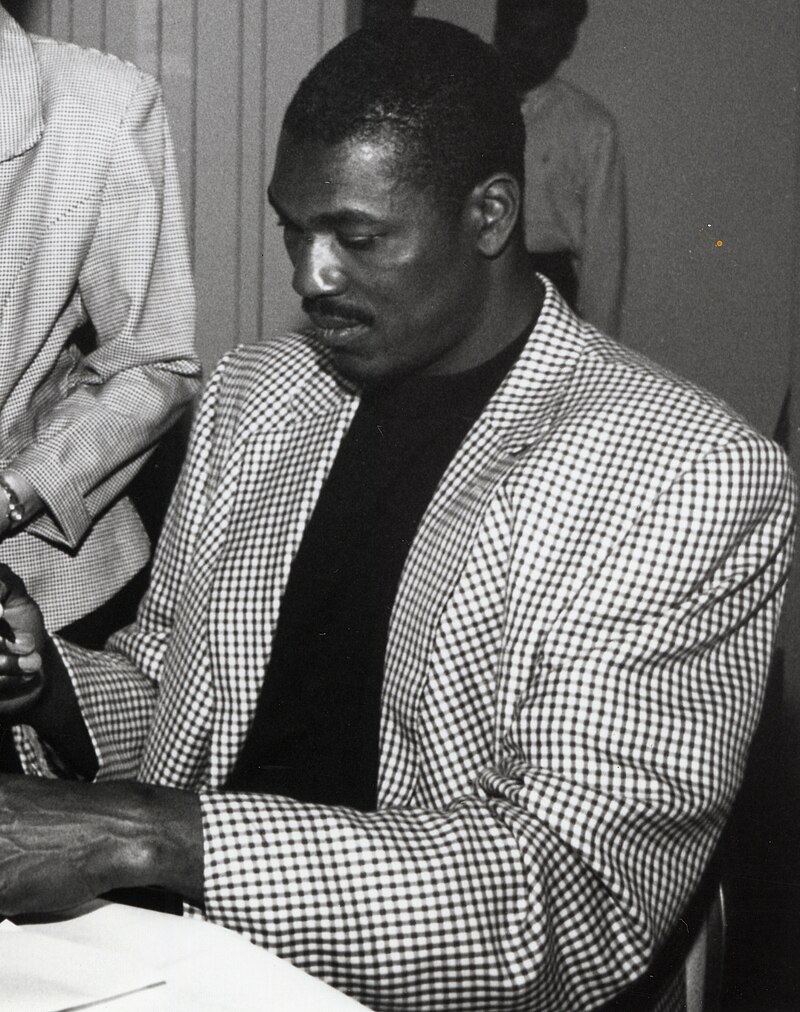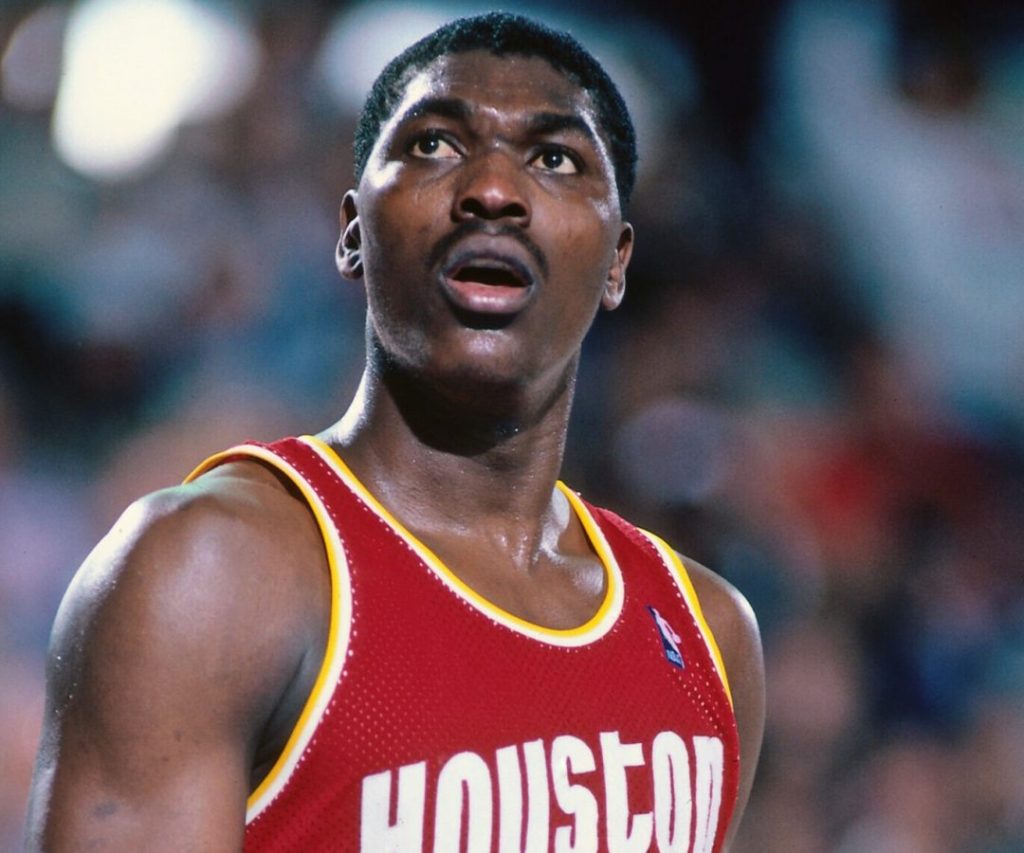Hakeem Olajuwon (Part 1)
Hakeem Olajuwon (Part 1)

Hakeem Olajuwon, born in Lagos, Nigeria, rose to prominence as one of the greatest basketball players in NBA history. His journey began at the University of Houston, where he showcased his talents and led the Cougars to three Final Four appearances under coach Guy Lewis.
Drafted by the Houston Rockets as the first overall pick in the 1984 NBA draft, Olajuwon joined forces with Ralph Sampson to form the formidable "Twin Towers" duo. This partnership led the Rockets to the 1986 NBA Finals, showcasing their dominance in the league.
After Sampson's departure, Olajuwon emerged as the Rockets' undisputed leader. He excelled on both ends of the court, leading the league in rebounding twice and blocks three times. Olajuwon's skill set was unparalleled, making him the first non-American to achieve various NBA milestones, including being an NBA All-Star, winning the NBA MVP and Defensive Player of the Year awards.
In the 1993–94 season, Olajuwon achieved a historic feat by becoming the first player to win the NBA MVP, Defensive Player of the Year, and Finals MVP awards in the same season. He led the Rockets to their first-ever NBA championship, defeating the New York Knicks in a memorable series.
The following year, Olajuwon guided the Rockets to another championship victory, sweeping Shaquille O'Neal's Orlando Magic in the NBA Finals. His dominance continued internationally as well, winning an Olympic gold medal with the United States national basketball team in 1996.
Throughout his illustrious career, Olajuwon left an indelible mark on the NBA, known for his exceptional skills as a center, his defensive prowess, and his ability to dominate the game on both ends of the court. His legacy is celebrated not only in the NBA Hall of Fame but also as a member of the NBA's 75th Anniversary Team, a testament to his enduring impact on the sport.
Hakeem Olajuwon's upbringing in Lagos, Nigeria, was shaped by the values instilled in him by his parents, who ran a cement business. He was one of eight children and learned the importance of hard work, honesty, respect, and self-belief from his family.
Despite misconceptions about his upbringing, Olajuwon emphasized the diversity and cosmopolitan nature of Lagos, where he grew up surrounded by people from various ethnic backgrounds.
During his youth, Olajuwon was involved in sheep herding and once famously defended his flock by killing a lion with a spear. He also played soccer as a goalkeeper, which contributed to his agility and shot-blocking abilities in basketball.
Olajuwon's basketball journey began relatively late, at the age of 15, when he entered a local tournament while attending the Muslim Teachers College in Lagos. Despite early struggles, he quickly fell in love with the game and dedicated himself to mastering it.
His remarkable athleticism and natural talent caught the attention of a college basketball scout, leading to his discovery and eventual recruitment to the University of Houston. Despite initially lacking basic basketball skills like dribbling and dunking, Olajuwon's determination and passion for the game propelled him to great success at the collegiate and professional levels.
Hakeem Olajuwon's journey to the University of Houston was not a traditional one. He was not heavily recruited and was only offered a visit to the university based on a recommendation. When he arrived for his visit, there was no one to greet him at the airport, and he had to take a taxi to the campus.
During his freshman year, Olajuwon redshirted because he couldn't obtain clearance from the NCAA to play. However, he quickly made an impact in the following season, averaging impressive numbers as the team's sixth man. Seeking to improve his game, Olajuwon sought advice from the coaching staff, who recommended that he work out with NBA star Moses Malone during the summer.
Training alongside Malone at the Fonde Recreation Center, Olajuwon honed his skills and rapidly developed into a formidable player. Malone's mentorship and the opportunity to compete against NBA-level talent helped Olajuwon elevate his game to new heights.
Returning to the university for his sophomore year, Olajuwon emerged as a dominant force on the court, earning the nickname "the Dream" for his effortless dunking ability. Alongside teammates like Clyde Drexler, he formed the legendary "Phi Slama Jama" fraternity known for their above-the-rim style of play.
Olajuwon's success continued into his junior year, where he played a crucial role in leading the Cougars to consecutive NCAA championship games. Despite falling short in both instances, Olajuwon's individual performance earned him numerous accolades, including the NCAA Tournament Most Outstanding Player in 1983.
After much deliberation, Olajuwon decided to declare early for the NBA draft in 1984, where he was selected first overall by the Houston Rockets. His decision was influenced by his desire to play for Houston, which had won the coin flip to secure the first draft pick.
In hindsight, Olajuwon's decision to enter the NBA draft early proved to be the right one, as he went on to have a legendary career in the league. However, there remains speculation about what could have been if the Rockets had accepted a trade offer that would have paired Olajuwon with Clyde Drexler and potentially allowed them to draft Michael Jordan. Such a scenario could have altered the course of NBA history.
References
- "Olajuwon, Hakeem – definition of Olajuwon, Hakeem in English from the Oxford dictionary". OxfordDictionaries.com. Archived from the original on February 3, 2016. Retrieved January 20, 2016.
- ^ Jones, Jonathan (February 1, 2017). "Hakeem refuses to be shaken by Trump's Muslim ban". Sports Illustrated. Archived from the original on July 13, 2021. Retrieved July 10, 2021.
- ^ Reimold, John (April 13, 2011). "Hakeem Olajuwon Remembered: The Best Center of All Time". Bleacher Report. Archived from the original on August 7, 2021. Retrieved August 7, 2021.
- ^ Reardon, Logan (June 8, 2021). "Where does Bill Russell rank among best centers in NBA history?". NBC Sports. Archived from the original on April 5, 2022. Retrieved July 10, 2021.
- ^ "The game's greatest giants ever". ESPN.com. March 6, 2007. Archived from the original on April 15, 2022. Retrieved July 10, 2021.
- ^ "NBA 75th Anniversary Team announced". NBA.com. October 21, 2021. Archived from the original on October 25, 2021. Retrieved March 16, 2022.
- "Hakeem Olajuwon" Archived June 23, 2020, at the Wayback Machine. NBA.com. Retrieved January 3, 2007.
- ^ Olajuwon and Knobler, p. 15.
- a b c Blount, Terry (May 22, 1994). "Hakeem: For the record/'Kunta Kinte' image was way off" Archived October 20, 2012, at the Wayback Machine. Houston Chronicle. Retrieved November 6, 2010.
- Howerton, Darryl. "It Was All A Dream". NBA.com. Archived December 13, 2006, at the Wayback Machine. Retrieved January 2, 2007.
- ^ Rapaport, Ron (April 4, 1983). "Olajuwon: He's not the best – yet" Archived April 5, 2022, at the Wayback Machine. Spokane Chronicle. Retrieved June 22, 2012.
- ^ Hakeem Olajuwon: Hakeem the Dream. NBA TV. March 1, 2007.
- ^ Newman, Chuck. Foreign-born players migrating to U.S. college basketball in ever-higher numbers. Archived September 30, 2007, at the Wayback Machine, November 15, 1995, accessed March 9, 2007.
- a b NBA TV Over Time:Hakeem Olajuwon, NBA TV, air date December 26, 2006.
- a b "Hakeem Olajuwon College Stats". College Basketball at Sports-Reference.com. Archived from the original on July 29, 2016. Retrieved February 9, 2019.








































